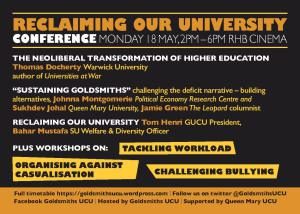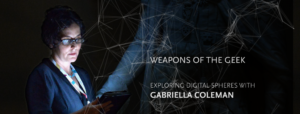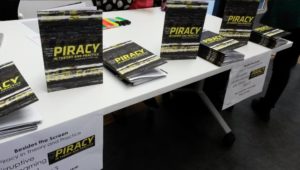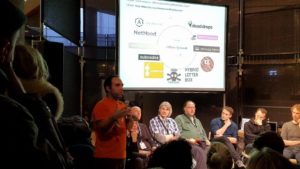… this was the abstract for the ‘show & tell’
… which we adapted and updated a little with the actual presentation:
» Show & Tell: the ‘S.o.S’ piratebox & beyondthis ‘show & tell’, held together with Adnan Hadzi, presents the reflections of the journey of the ‘S.o.S’ piratebox, a research hosted and interlinked with work-and-research structures of the Brazil Besides the Screen conference, the Istanbul Video Vortex event, the reSync Athens workshop, and finally the Berlin Transmediale festival.
Materials were loaded onto a research-black-box (Pirate-Box) that could & can accumulate and ‘commonize’ critical material, travel and be presented at any place in any time.in particular we would like to discuss our ideas on new modes of collective and spectral research.
… and possibly give an outlook of the upcoming ‘after.video’ project that evolved partly out of this – basing theory exposition on video as carrying format.—in my part I show some attempts to develop formats of credible ‘theory’-production beyond the text-form – and show some collective and media-saturated examples, also arguing for blurry lines between ‘academic’ theory building and other forms when it comes to contemporary cultural and social phenomena – or media culture itself.I also touch upon the impact a social semiotics approach has to formats of theory (theoretical referencing) itself, and touch upon questions of ‘cultural referencing’ – and its inherent difficulties in times of new global copyright regimes that particularly enclose the ‘moving image’.while complex systems of para-textual reference, exposition and theory-building are getting more and more abundant (making it possible to turn events like a conference into a hyper-text), the options to extend cultural references to the most central cultural ‘para-texts’ and semiotic resources is getting more and more problematic.
… thus the current phenomena in research, theory building and other forms of systematic ‘cultural referencing’ are showing us, how every new medial formation – and indeed: every new research formation – implies new forms of ‘piracy’ in its entourage. «
Departing from the relation of movie piracy with the economy and politics of content distribution, the symposium means to discuss the dynamics of authority embedded in contemporary systems of communication and explore how informal media practices might intervene with the development of new technologies, frame film curating, foster or inhibit particular scholarships, and even raise questions about the ontology of the moving image. BTS 2015 announcement
:: Besides the Screen
» seeks to make an intervention into film and screen studies by examining and considering the elements of cinematic experience, production and dissemination that exist beside the screen. New media technologies impact cinema well beyond the screen; they also promote the reorganization of its logic of distribution, modes of consumption and viewing regimes. This publication speculates about the changes in modes of accessing, distributing, storing and promoting moving images and how they might affect cinematographic experience, economy and historiography. In doing so, Besides the Screen examines three key themes: distribution, promotion and curation. The volume’s main argument is that we must examine those practices that exist besides the screen if we are to consider fully how filmic experience is mediated by various technological and societal changes in the early decades of the twenty-first century «
Programme
Thursday 9th April 2015 12.00 – 17.00 – DMLL Grass – Workshop [invited participants online]
17.00 – 19.30: Besides the Screen Book Launch
Friday 10th April 2015 DMLL Teaching Room
10.00 – 10.30: Welcome and Intro to Besides the Screen Network – Virginia Crisp
10.30 – 12.00: Panel 1
_ The Pirate Cinema – Nicolas Maigret The Pirate Cinema
_ Read Me – Maria Roszkowska
_ Tropa(s) de Elite: of the Forms Created within Informal Media – Gabriel Menotti
12.15 – 13.45: Panel 2
_ Torrentocracy: Archival Chivalry and Piratical Honourability – Jonas Andersson Schwarz
_ Show and Tell: the ‘S.o.S’ Piratebox and Beyond – Adnan Hadzi and Oliver Lerone Schultz
_ Gambiarra Culture in Brazil and its Impact on Piracy – h.d. Mabuse
14:30 – 16.00: Panel 3
_ Piracy and Access to Educational Materials in Rio de Janeiro: Shadow Libraries and Beyond – Pedro Mizukami
_ Reimagining Film History Through Piracy: Reflections on the Case of Budget Films, 1975 – Paul McDonald
_ Pirate Capitalism: The Theory and Practice of Monstrosity – Gary Hall
16.15 – 17.45: Plenary Lecture
_ Piracy and Economic Plurality Ramon Lobato
17.45 – 18.00 Closing remarks – Virginia Crisp
Adnan Hadzi – Spectrals of the Spectacular from Besides the Screen on Vimeo.





